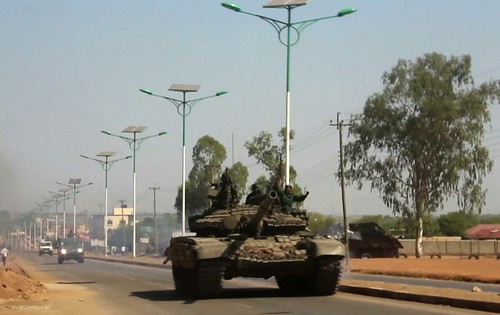
South Sudan tank during attempted coup on December 17, 2013. Reports indicate that more than 500 have been killed., a photo by Pan-African News Wire File Photos on Flickr.
5 January 2014
Last updated at 09:38 ET
BBC World Service
South Sudan general killed in ambush
A South Sudanese army general has been killed in fighting outside the rebel-held town of Bor.
A BBC correspondent with government troops said a convoy advancing on Bor came under heavy fire in an ambush.
The fighting is continuing as the warring parties meet in Ethiopia to try to agree a ceasefire. Substantive talks are due to start later on Sunday.
The conflict pits supporters of President Salva Kiir against rebels led by his sacked deputy Riek Machar.
It began on 15 December after the president accused Mr Machar of attempting a coup - which he denies.
At least 1,000 people have been killed and nearly 200,000 displaced in the conflict, which has taken on ethnic undertones. Mr Kiir is from the Dinka community and Mr Machar from the Nuer group.
'Arm twisting'
The BBC's Alastair Leithead, who is with government troops 25km (15 miles) from Bor, says large numbers of reinforcements have been brought in, bringing the total there to some 2,000.
President Kiir's forces have been trying for several days to retake Bor, our correspondent says.
The fighting in effect involves two trained armies, as the rebel forces include former army units, our correspondent adds.
Fighting is also continuing in other areas.
Army spokesman Philip Aguer said there had been clashes in the oil-producing states of Unity and Upper Nile in the north.
Up until Friday, the talks in the Ethiopian capital, Addis Ababa, were conducted by mediators. Now, teams representing the opposing factions are expected to negotiate face-to-face.
A preliminary meeting was held late on Saturday. Key issues are establishing a ceasefire, and the rebels' demand for the release of what they see as political prisoners.
But South Sudan spokesman Michael Makuei said the government would resist international pressure to free supporters of Mr Machar arrested in the capital, Juba, at the start of the conflict.
He said releasing "those who attempted to overthrow a democratically elected government" would set a "bad precedent".
"Are we not risking the governments of Africa and the rest of the world to such attempts?
We should not be arm-twisted because we are a new nation."
Meanwhile the first aid flight to South Sudan funded by the UK government has arrived in the country. The aircraft, carrying emergency aid and sanitation supplies, landed in Juba, on Sunday.
South Sudan is the world's newest state. It was formed in 2011, gaining independence from Sudan after decades of conflict.
The latest trouble has its roots in tensions that go back long before 2011.
No comments:
Post a Comment